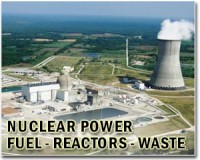 |
Amman (AFP) April 14, 2011 Following the nuclear disaster in Japan, experts in Jordan want their energy-poor country to drop its ambitious plans to generate atomic power, despite reassurances by the kingdom's nuclear regulator. "The project lacks environmental assessment and feasibility studies," environment ministry adviser Rauf Dabbas told AFP. "We do not know its actual cost. We do not know what precautions should be taken to prevent a nuclear catastrophe in the country." Jordan, which imports about 95 percent of its energy needs, has signed nuclear cooperation agreements with several countries, including Japan, in a bid to produce atomic energy for power generation and water desalination. Its 1.2 billion tonnes of phosphate reserves are estimated to contain 130,000 tonnes of uranium, and the government wants the first nuclear plant to be ready by 2019. A Japanese-French consortium, as well as Russian and Canadian groups, are seeking to win a bid for the project, while South Korea has loaned Jordan $70 million (48.3 million euros) to help build a five-megawatt nuclear research reactor worth $130 million. But concerns in the kingdom have been growing after a 9.0 magnitude earthquake hit Japan's northeast coast on March 11, and the Fukushima Daiichi nuclear plant began leaking radiation into the air, sea and soil, contaminating farm produce and making its way into tap water. The plant was swamped by a ferocious tsunami that left almost 13,500 dead and 15,000 missing. Tens of thousands more were made homeless. Reactor cooling systems were knocked out, allowing atomic cores to heat up uncontrollably and sparking a nuclear emergency now classified as a maximum level seven on an international scale, on a par with Chernobyl. "The biggest challenge for Jordan is the cooling systems. How can a water-poor country like the kingdom build a nuclear plant?" Dabbas said. With desert covering 92 percent of its territory, Jordan, one of the world's 10 driest countries, is battling to face chronic water shortages and meet needs for its increasing population of 6.3 million. "Our entire region is exposed to earthquakes. We are a small country and any nuclear leak will remain in Jordan for 5,000 years," Dabbas said. "There are alternative solutions, like building solar and wind power systems, which can produce thousands of megawatts. Also, we can always ration our energy consumption." Khalid Irani, a former environment minister, said "there are a lot of questions about Jordan's nuclear plans." "These questions need to be answered first before supporting or fighting the project," he told AFP. "We need to know if the plans are feasible and we need to study their environmental impact, as well as the location of the plant, how to deal with nuclear waste and the funding." Irani added that "some exaggerate about their fear of nuclear energy, without having scientific knowledge." Jordan's Atomic Energy Commission sought on Tuesday to reassure Jordanians, saying it is ready to hold a referendum on the nuclear plans. "Some people exploited what happened in Japan to attack Jordan's nuclear programme, spreading inaccurate and unscientific information," a statement said. "The commission is ready to hold a referendum on this national project if necessary." Jordan is the latest Sunni Arab country, including Egypt and pro-Western Gulf Arab states, to announce plans for nuclear power programmes in the face of Shiite Iran's controversial atomic drive. "The commission and its nuclear plans have failed before they began," prominent columnist Fahd Fanek wrote in the government-owned Al-Rai newspaper. "It is defending itself and existence in order to survive, just like any other institution that has expired."
Share This Article With Planet Earth
Related Links Nuclear Power News - Nuclear Science, Nuclear Technology Powering The World in the 21st Century at Energy-Daily.com
 OSCE urges members to carry out nuclear stress tests
OSCE urges members to carry out nuclear stress testsVienna (AFP) April 13, 2011 OSCE chair Lithuania urged the security body's 56 member states Wednesday to conduct stress tests on their nuclear plants, in the wake of Japan's nuclear disaster. Lithuanian President Dalia Grybauskaite "called on all OSCE participating states to be more open to co-operation on nuclear power safety issues and to perform stress tests on nuclear power plants," the Organisation for Security a ... read more |
|
| The content herein, unless otherwise known to be public domain, are Copyright 1995-2010 - SpaceDaily. AFP and UPI Wire Stories are copyright Agence France-Presse and United Press International. ESA Portal Reports are copyright European Space Agency. All NASA sourced material is public domain. Additional copyrights may apply in whole or part to other bona fide parties. Advertising does not imply endorsement,agreement or approval of any opinions, statements or information provided by SpaceDaily on any Web page published or hosted by SpaceDaily. Privacy Statement |